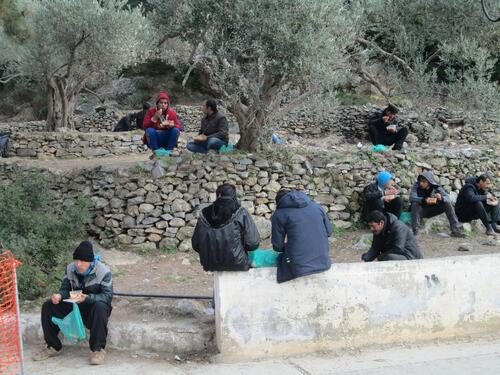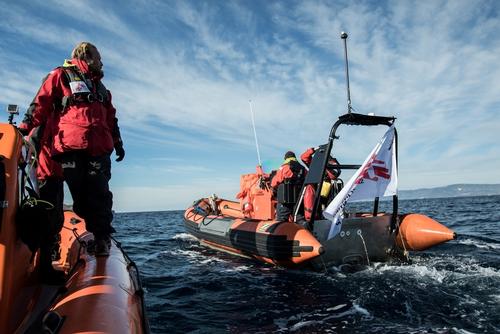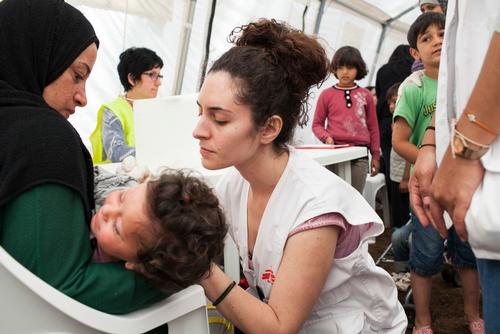With the arrival of winter the number of refugees landing on the Greek island of Samos has shrunk. In October more than 500 people were arriving every day where as in January there were no more than 150. But there have never been so many accidents as now. More than 400 people drowned off the coast of Greece in January. More than 30 of these happened off the coast of Samos. The crossings are made under very difficult conditions with a cold wind and more often than not the very small boats take on water.
Turkey is very close to Samos. The closest point on the crossing is at most 1,600 metres, but the currents are strong. So people are using longer routes, but then the journey can take several hours. When they arrive on the Greek coast, whether at Samos or Agathonisi, a small island situated just opposite Samos where MSF teams are present, the refugees are often wet and shivering. Most of them come from Syria, Iraq or Afghanistan but there are also Iranians, Pakistanis and people from across Africa.
We try to be ready for the migrants from the moment they land. At Samos, we have developed a network of people, including volunteers and officials such as police men, fire men and coast guards, who alert us when a boat arrives. As soon as they receive a call, the MSF team goes to meet the refugees whether it’s day or night. They deliver emergency first aid if it’s needed and distribute water, sugary biscuits and blankets if their clothes are wet. We see groups of around ten people arrive as well as much larger ones. Two weeks ago a group of 74 people, including many women carrying their young children in their arms, landed in the middle of the night.
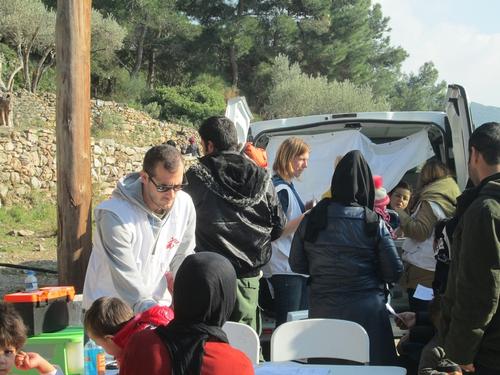
Then we take them by bus to the port at Samos where is the registration centre. We take them by bus because otherwise they would have to do this long journey by foot, but also because they’re often lost and don’t even know they’re on an island. On the way, we give them practical information on the registration process as well as information about the two camps on Samos, where volunteers and organisations provide aid. MSF also has a team providing medical care in the two camps.
The refugees tend to only have one idea in mind and that’s to follow their route. To do this, they must wait to be registered by the police, which can take a few days or weeks depending on their nationality. Once they’ve received their registration paper they can take a ferry to Athens, then a bus to the Macedonian (Former Yugoslavian Republic Of Macedonian) border. But there, only the Syrians, Iraqis and Afghanis are allowed to cross. Since the beginning of December people of all other nationalities have been driven away from the border which means a large number of refugees find themselves back in Athens.
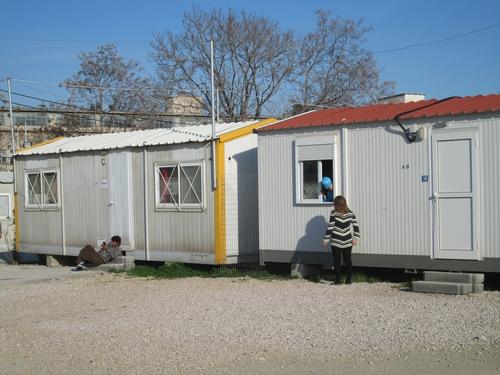
The Eleonas centre set up by the Ministry for Migration in the outskirts of Athens welcomes vulnerable people such as families with young children and asylum seekers. We have set up a clinic there which is open 7 days a week from 2pm until 8pm. An MSF medical team works there with two interpreters, one Arab and one Farsi. The refugees are also gathering informally in places in Athens, such as Victoria Square. This small square has become a place of passage for those who are stuck in Greece and who want to get information or receive aide. Some people spend the night outside in the surrounding streets. Since the 12th February MSF has been running a clinic from 5pm to 9pm in a nearby location, next to Victoria square, in order to offer medical help to all these refugees and migrants who are the most vulnerable. During the day another organisation is there to support women and children who are in transit in Athens.
MSF is providing medical and psychological assistance to people arriving on the islands of Lesbos, Samos and on the Dodecanese islands.On Lesbos, MSF is providing transport for the new arrivals from the northern coast to the registration center, we set up and give assistance in Matamados transit centre and provide medical care in the reception centres of Kara Tepe and Moria. In Samos, MSF teams do a medical screening and care to newly arrived, provide transportation, food and essential reliefs at the port of Vathy and in the reception centre. In the Dodecanese islands, MSF is running mobile clinics and providing psychological first aid to the victims of the shipwrecks. Since the beginning of its operations in the Greek islands, MSF teams have provided more than 22,100 medical consultations.



